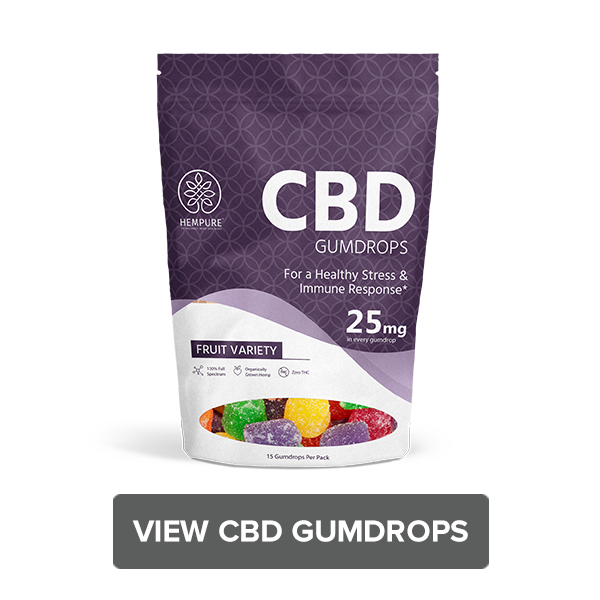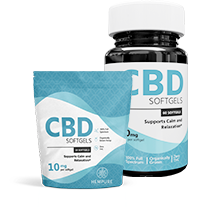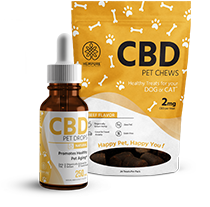Everything You Need To Know About The 2018 Farm Bill (Updated)
Sabina King on Jun 19th 2019
The 2018 Farm Bill is an exciting bill for the hemp and CBD industry.
This bill passed today (12/20/2018), resulting in many changes for hemp and CBD throughout the United States.
Watch the President sign The 2018 Farm Bill into law here.
In this article, we will examine why the 2018 Farm Bill is such a big deal, what makes it so different from the 2014 Farm Bill, the effects it will have on the hemp and CBD industry, and examine some of the flaws that it contains. We reached out to some experts in the industry to get their thoughts on the impact the new bill will have.
What Does The Farm Bill Do?
To put it simply, the farm bill will fully legalize CBD and hemp!
But wait, I thought CBD and hemp were already legal? They both became legal after the passing of the 2014 Farm Bill, but there’s some legal grey area that has a lot of people confused. It has also left many organizations unsure of whether or not they are legally able to work with CBD companies.
The confusion results from the way the government classifies hemp, marijuana, and cannabis. Both hemp and marijuana are forms of cannabis. The United States government classifies hemp as any plant of the cannabis species that contains less than 0.3% THC. It classifies marijuana as any plant of the cannabis species that contains greater than 0.3% THC. THC Is the psychoactive component in cannabis that produces the “high” that made the plant famous.
When the 2014 Farm Bill was passed, it legalized hemp. However, when it did so, it did not include specific wording that would remove hemp from the Controlled Substances Act. The Farm Bill technically trumps the Controlled Substances Act, or CSA for short, in terms of superiority. However, because it did not officially remove it from the CSA, it left some people unsure of whether hemp was fully legal.
The Old Bill (2014 Farm Bill)
We hired a team of lawyers earlier this year to sort all of this out, and you can read about it here. To sum it up, hemp was made legal in 2014, but not explicitly removed from the Controlled Substances Act, leaving some people to question its legality even though it was technically legal.
The 2018 Farm Bill clears up any confusion as to the legality of hemp and CBD. Jonathan Miller, general counsel of the U.S. Hemp Roundtable, noted these points in a summary he wrote of the 2018 Farm Bill:
- The era of hemp prohibition is over. Hemp is now permanently removed from the Controlled Substances Act (CSA). It is forever deemed an agricultural commodity, no longer mistaken as a controlled substance, like marijuana.
- By redefining hemp to include its “extracts, cannabinoids and derivatives,” Congress explicitly has removed popular hemp products -- such as hemp-derived cannabidiol (CBD) -- from the purview of the CSA. Accordingly, the Drug Enforcement Administration no longer has any possible claim to interfere with the interstate commerce of hemp products. This should give comfort to federally regulated institutions -- banks, merchant services, credit card companies, e-commerce sites and advertising platforms -- to conduct commerce with the hemp and hemp product industry.
Other Experts Weigh In
We reached out to one of our favorite hemp writers, Kit O’Connell from Ministry of Hemp, to get his thoughts on what the passing of the 2018 Farm Bill means for the CBD and hemp industry:
“It will be amazing to see what tomorrow brings, if this passes! Taking hemp & CBD out of the hands o
My impression is that CBD is widely supported, and that government officials increasingly understand its benefits and that it should be accessible to consumers. At the same time, CBD & hemp will now be under the oversight of the Department of Agriculture & the FDA, whereas until now they've been largely unregulated or under state control. There are going to be changes and growing pains and adjustments for everyone.”f the DEA, even though they have been largely unwilling to act on their threats, will remove a gray cloud that's hanging over the industry. I think it will also discourage over-reaction by local agencies too, meaning we're much less likely to see police, etc raiding local vendors of hemp and CBD products, which is something that unfortunately happens too often now.

Buying hemp and CBD have been legal for the past 4 years. However, the grey nature of the law left some key things missing from the industry. We asked Vadim from CBD School about what he thought the new bill meant for the CBD and hemp industry:
"We are going to get everything our industry needs. Regulation for quality control. Clear rules and guidelines. Insurance for the farmers and extractors. Investment dollars for the entrepreneurs. Lower prices for the consumers. It's going to be great. We are ready."
Better Research Will Be Possible
We also reached out to Matthew Stein from RevOffers to get his thoughts on the 2018 Farm Bill.
He had this to add:
“Well now that Farm Bill has passed and will likely be signed into law, I believe this will have many positive implications for the hemp and CBD market. One major implication is that it opens up the restrictions
on research that can be done to provide clinical evidence of the healing effects that we have all been hearing about and experiencing anecdotally for years. Additionally, it will move hemp and CBD out of the legal purgatory that it's been in for the last several years and allow consumers to have more confidence that they can safely and legally purchase these products.
Furthermore, the companies who are manufacturing CBD can also sleep a little easier at night knowing the federal government won't come knocking on their door. There have been many projections on how much the CBD market will grow over the next few years. Personally, I think it's difficult to pin down a number but it wouldn't surprise me if we saw a $2-4 billion dollar market by 2020. Finally, one of the most important and potentially concerning aspects of the Farm Bill passing will be regulation. We know that regulation is coming but it's imperative that regulators work to make the industry safer and not prevent people from getting the cannabinoids they desire. Let's make sure that the product making its way into the hands of the consumer is safe, efficacious and contains only what it says on the label, in the amounts claimed.”
Other Changes That May Come From The 2018 Farm Bill
Currently, many banks and online retail services refuse to work with CBD companies. Amazon refuses to sell CBD unless it is marked as “hemp oil.” Facebook and Google both prevent companies from advertising on their platforms. This has stunted the growth of the CBD industry and prevented many companies from being as profitable as they could be. With the 2018 Farm Bill, this will likely change.
As companies are able to operate with greater ease and at a lesser cost, they can focus more of their energies to innovating and improving their products. Coca Cola stated that it is monitoring the cannabis industry. Major beer companies are investigating ways of infusing their brews with CBD. Altria, the company that owns tobacco behemoth Marlboro, recently purchased 45% of Chronos, a Canadian cannabis company.
Moves by these major brands indicate a shifting tide in the public perception of cannabis.
Vadim from CBD School offered this about the public’s changing views of hemp and cannabis:
“The public wants cannabis. It's never been more clear. In every single survey you look at from last decade or so, there is a majority approval of cannabis, and especially therapeutic uses of cannabis. That obviously included hemp CBD. The public will react with massive approval. They already know how powerful (all the uses) the hemp plant can be. They already know it should NEVER HAVE BEEN ILLEGAL.”
A Potential Boom?
Kit O’Connell had this to say about the public’s perceptions of hemp and cannabis:
“There's huge support for hemp and all forms of the cannabis plant right now, so I expect the public to be thrilled! So many people are interested in getting involved in hemp farming and the industry at every level, this could be the start of a real boom. At the same time, we need to grow responsibly to avoid creating an economic bubble.”
CBD and hemp offer so many benefits for consumers. While their has been some science that has investigated the benefits, there has not been enough studies to really make full conclusions. With the passing of the 2018 Farm Bill, more research will be able to be conducted. This will give even more information about the benefits of CBD and the many ways in which people may be able to incorporate it into their lives.
Problems with the 2018 Farm Bill
While the farm bill is a breath of fresh air for so many people, there are some people that will stand to miss out on its benefits.
The 2018 Farm Bill excludes anyone with a felony drug conviction from being able to grow hemp. Considering that possession of hemp was once a felony, it stands to reason that some people with hemp growing experience may have a record.
While it makes sense that some people should be excluded from the hemp industry, some people have spoken out against the addition saying it is unfair to people with non-violent drug convictions.
Outside Thoughts On The Problems With The Bill
Kit from Ministry of Hemp had this to say:
“Ministry of Hemp was one of the first media outlets to report on the felony ban, and we've opposed the provision from the start. While we try to remain neutral overall on American politics as a publication, we believe everyone should have access to hemp. It's fundamentally unfair to single out people with drug convictions in this way, when no other crop has these kinds of restrictions. Additionally, because of how hemp & psychoactive cannabis ("marijuana") grow, there's little to no danger of someone using hemp to hide pot. If you grew psychoactive cannabis in your hemp field, due to cross-pollination you would end up with terrible unsmokeable cannabis and hemp that was too high in THC to be legally sold.
I understand some kind of "compromise" is being struck on this provision, which might allow people who are already in the industry to remain in the industry, but it sounds like it's still deeply flawed. Advocates for the law have repeatedly said that it will be easier to fix the problems in the law once it passes, and I hope they are right. I don't want to see this become the status quo.”
You can read his full article about this addition here.
Weighing In On Problems in The Bill
Vadim from CBD School also noted:
“I don't like it. Many of the people with the most in depth experience growing and processing hemp + cannabis are "felons". I understand why there are these protections put in place to keep real criminals out. My preference would be that the hemp licenses were given on a case-by-case basis, instead of just eliminating all felons. But that's not the situation we have right now. I expect it to change in the future. All cannabis laws will change in the future. It just moves slow.
Bottom line: If I had to pick farm bill or no farm bill, even with this stipulation, you already know what I would pick. No brainer.”
A New Industry Forms
It is rare that an industry is able to get a fresh start. With the 2018 Farm Bill, the hemp and CBD industries will be able to start off on new ground. This gives the companies within the industry and the many entrepreneurs venturing into this world an exciting opportunity to create a well-regulated and healthy industry that will serve the public well.
We asked Kit O’Connell about what he thought of this clean slate and what companies could do to ensure the industry gets off to a good start:
“Brands need to prioritize being high quality, responsible, and transparent in their business practices. There's a lot of hype around hemp & CBD right now, which means unscrupulous actors getting involved. I think we'll have a better relationship with both the government and CBD consumers if we make sure our products are clearly labeled, free from contaminants, synthetics and toxins, and third-party lab results are always easily available, so consumers can see the full profile of the products they are buying.
We should also look to Canada, and learn from their example. They legalized in the 1990s, but it took decades to build a sustainable hemp industry with the infrastructure needed to support that. There were a lot of initial failures where farmers invested in hemp but then couldn't find any buyers for their crop. We need to make sure we do better by American farmers and people in general right from the start.”
We asked Vadim from CBD School the same question and he had this to add:
- Labs, labs, labs - we have to prove that we are making clean and safe products. We need to be pharma quality w/o the pharma bullshit and gatekeepers. 2. Brands, don't kill each other. The industry is competitive and that's a good thing. But we are all in it together so it's better to have positive camaraderie than a vicious cut throat situation. 3. Know your cannabis. Study the plant. Get into it!! Really know all this stuff and read up on the details. Your customers will love you for it.
Conclusion
The 2018 Farm bill offers tremendous promise for anyone interested in hemp and CBD. It will put an end to any questions regarding the legality of both substances. As this happens, the hemp and CBD industries will be able to grow in ways that are not currently possible. The consumer benefits because of the ease of obtaining CBD and hemp as well as lower prices. More brands are siding with cannabis and it seems that the public is beginning to open its arms to it.
While the 2018 Farm Bill will revolutionize many aspects of hemp and CBD, it does have some negative sides. Many do not like the idea of banning anyone with a felony from growing hemp. Even if the bill passes with this aspect in it, it will still be possible to amend later.
The 2018 Farm Bill will change everything about hemp and CBD in the United States. Continue to check back here for more updates about the bill and how it is impacting the country.
















